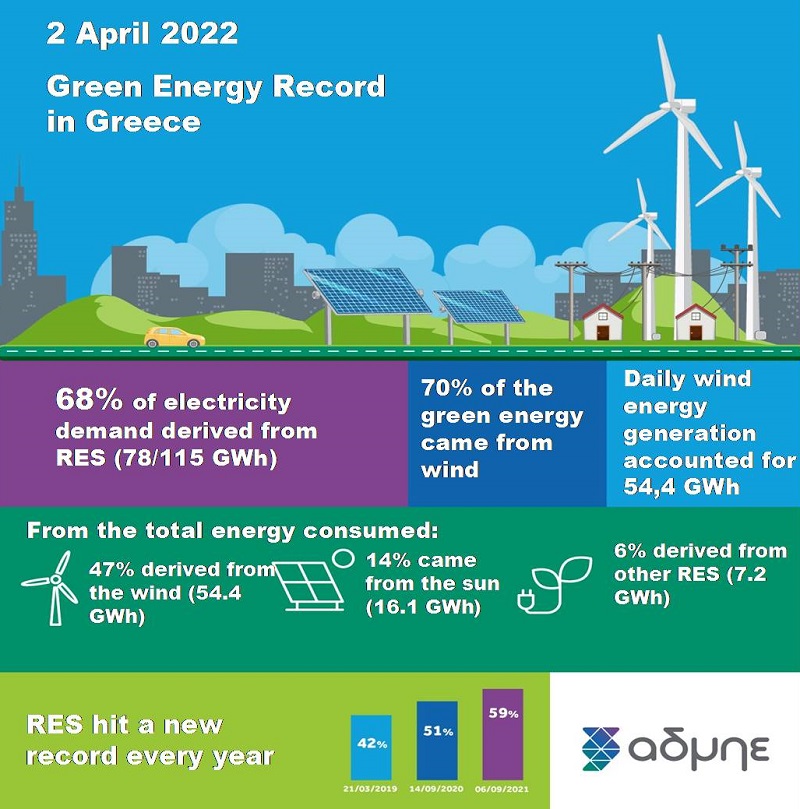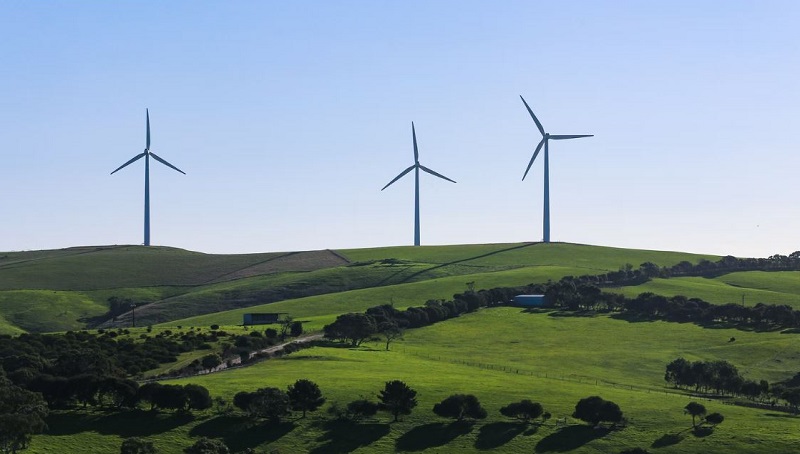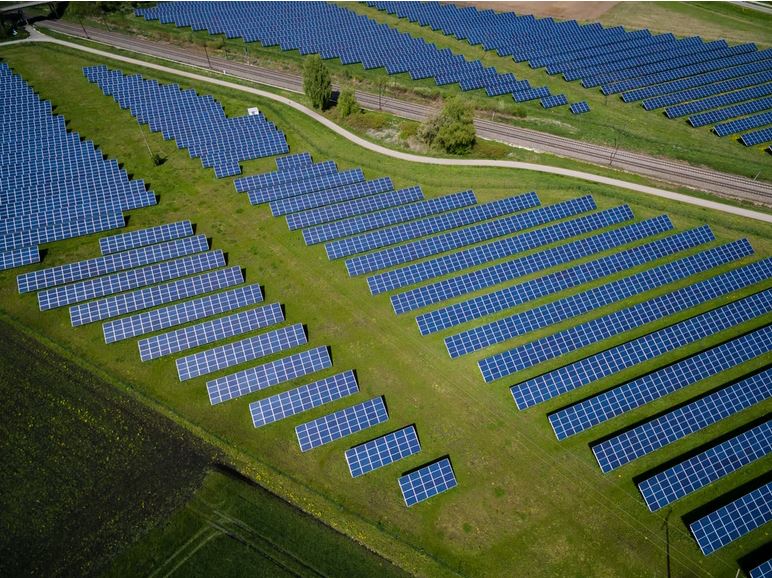Greece adopted a National Plan for Energy and Climate (NPEC) in December 2019 in order to combat climate change and protect the natural environment mainly through Renewable Energy Sources. Safeguarding energy supply and security against energy or geopolitical crisis incidents is an additional advantage of green electricity. According to the National Plan, decarbonisation i.e. the ending of Greece’s reliance on lignite, is scheduled to be achieved by 2028, as a top priority, while Renewable Energy Sources (RES) are projected to reach the 65% of electricity production in 2030, becoming the main national energy source in Greece.
Green energy hit record in Greece last April
It is surprising thus that Greece on April 1st and 2nd 2022 covered, through green technologies, 67 and 68%, respectively, of its energy needs both at investing and demand level. 70% percent of the green energy derived from the wind, while concerning the total energy consumed, 47% derived from the wind, 14% derived from the sun and 6% derived from other RES.
The operation of the system constitutes a great daily performance, due to favourable weather conditions on these specific days, indicating that this can easily be the rule in a few years. To this end major storage works are necessary in order to maximise the benefits of the green energy, preserving at the same time the stability of the electricity system.
In fact, in the last three years Renewable Energy Sources have been covering daily energy demand with an increasing share. According to the Greek Independent Power Transmission Operator (IPTO / ADMHE) starting from a share of 42% of the daily energy demand in 21/3/2019, rising to 51% in 14/9/2020 and 59% in 6/9/2021, the share of RES on a daily basis in Greece has been growing in a fast pace. What is more, wind energy in 2021 contributed the most in the RES mix with a share of 48%, while solar energy counted for 10%, and 1% came from the rest of RES. And this is by far the best performance among the EU even in comparison to countries with high wind energy production capacity and it is due to more favorable weather conditions in Greece in that specific period of time.

Source: Greek Independent Power Transmission Operator (IPTO / ADMHE)
Is the goal for 65% RES share in electricity production by 2030 reachable?
According to the NPEC, Renewable Energy Sources should be the main national energy source in Greece by 2030 reaching the 65% of electricity production. To this end Greece aims to achieve 25 GW of installed renewable power generation capacity by 2030 from the current 8.62 GW, while electric energy storage units of at least 3.5 GW must have been in operation by the end of the decade.
According to the CEO of the Hellenic Wind Energy Association HWEA/ELETAEN, Panagiotis Papastamatiou, this goal is achievable for the following reasons:
– Wind and solar energy is based on proven technologies
– Greece is rich in Renewable Energy Sources taking into consideration that solar and wind are inexhaustible sources of energy
– Investing interest has already been expressed and adequate funding is foreseen
Photo by Andreas Gücklhorn on Unsplash
Benefits of the Renewable Energy Sources
Green energy apart from being eco-friendly is also beneficial in economic terms. As Panagiotis Papastamatiou explains: “The cost of production from RES is clearly lower than fossil fuels and nuclear. It is also stable and known in advance as it depends only on the cost of wind turbines or photovoltaics paid at the beginning of the investment. The cost doesnot alternate every month, as is the case for fossil fuels. At present, the new wind farms in Greece generate electricity at 3-4 times lower cost in relation to the cost of electricity generation from fossil fuels”.
What is more, RES directly contribute to electricity prices reduction which results in suppliers buying cheaper and therefore having the opportunity to pass on these lower prices to their customer’s (households and businesses) tariffs. According to data provided by the HWEA/ELETAEN, Renewable Energy Sources saved 2.5 billion euros in 2021 for the benefit of the consumers.
A new draft bill and a large solar park in Greece reinforce RES prospects
Aiming to address the climate change by reducing the greenhouse gas emissions increasing at the same time the country’s energy self-sufficiency the Greek government is preparing a bill for RES and electrical energy storage projects. The main areas of the draft bill are the simplification of the licensing process for renewables and storage licensing, while the main objectives of the draft law are to:
• reduce the average licensing time for new RES projects from five years to 14 months;
• develop electricity storage projects with an installed capacity of at least 3.5 GW by 2030;
• increase the capacity of the electricity network to enable integration of more RES units
The key goals are to increase the Renewable Energy Sources (RES) share in (a) the country’s energy mix, up to 35%, and (b) the national production of electricity, up to 70%. The bill will also give municipalities and regional authorities incentives for the installation of RES units in order to provide cheaper energy to vulnerable consumers and households living below the poverty line.
Last month a new solar park the biggest system with two-sided, or bifacial, panels in Europe was inaugurated by the Greek Prime Minister, Kyriakos Mitsotakis. The 204-megawatt solar park was built in the northern Greek town of Kozani by Greece’s biggest oil refiner Hellenic Petroleum, one of the largest oil companies in the Balkans that is undergoing a transformation into clean energy. The park will supply power to 75,000 households and connect to the country’s power grid in coming weeks reflecting Greece’s national goals for cheap and clean energy from the sun, the wind, and the water, as the Greek Prime Minister stressed at the park’s inauguration.
*** You can check for yourself how green is the energy that we produce and consume in Greece at any time through the new mobile app of IPTO / ADMHE providing data of the Hellenic Electricity Transmission System, in a convenient and easy way. The app is also available in English. ***
Read more via Greek News Agenda:
Greece’s Green Agenda on Energy and Climate
The “Smart Green Island” of Astypalea
Renewable Energy in Greek Islands: Tilos Shows the Way with Innovative Smart Grid
Chalki, the first Gr-Eco Island
Kassos, the small Greek island that goes for a sustainable, green growth
IE
Intro Photo by Alex Eckermann on Unsplash
TAGS: BUSINESS & TRADE | ENERGY | ENVIRONMENT















